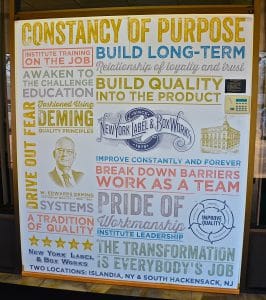Dr. W. Edwards Deming offered 14 key principles for management to follow to improve the effectiveness of a business or organization significantly. The principles (points) were first presented in his book Out of the Crisis. Below is the condensation of the 14 Points for Management, but these alone will not improve your business.
As noted by Dr. Deming in The New Economics, "My 14 Points for Management follow naturally as application of the System of Profound Knowledge for transformation from the present style of management to one of optimization."
To learn more about Dr. Deming's philosophy and how the 14 Points for Management can be meaningfully implemented, check out DemingNEXT - the new online learning platform for those new to Deming or veterans seeking to deepen their understanding.
Looking for more in-depth understanding of Deming's 14 Points, System of Profound Knowledge, or other aspects of Dr. Deming's philosophy? DemingNEXT has all the answers!
1. Create constancy of purpose toward improvement of product and service, with the aim to become competitive and to stay in business, and to provide jobs.
2. Adopt the new philosophy. We are in a new economic age. Western management must awaken to the challenge, must learn their responsibilities, and take on leadership for change.
 3. Cease dependence on inspection to achieve quality. Eliminate the need for inspection on a mass basis by building quality into the product in the first place.
3. Cease dependence on inspection to achieve quality. Eliminate the need for inspection on a mass basis by building quality into the product in the first place.
4. End the practice of awarding business on the basis of price tag. Instead, minimize total cost. Move toward a single supplier for any one item, on a long-term relationship of loyalty and trust.
5. Improve constantly and forever the system of production and service, to improve quality and productivity, and thus constantly decrease costs.
6. Institute training on the job.
7. Institute leadership. The aim of supervision should be to help people and machines and gadgets to do a better job. Supervision of management is in need of overhaul, as well as supervision of production workers.
8. Drive out fear, so that everyone may work effectively for the company.
9. Break down barriers between departments. People in research, design, sales, and production must work as a team, to foresee problems of production and in use that may be encountered with the product or service.
10. Eliminate slogans, exhortations, and targets for the work force asking for zero defects and new levels of productivity. Such exhortations only create adversarial relationships, as the bulk of the causes of low quality and low productivity belong to the system and thus lie beyond the power of the work force.
11a. Eliminate work standards (quotas) on the factory floor. Substitute leadership.
11b. Eliminate management by objective. Eliminate management by numbers, numerical goals. Substitute leadership.
12a. Remove barriers that rob the hourly worker of his right to pride of workmanship. The responsibility of supervisors must be changed from sheer numbers to quality.
12b. Remove barriers that rob people in management and in engineering of their right to pride of workmanship. This means, inter alia, abolishment of the annual or merit rating and of management by objective.
13. Institute a vigorous program of education and self-improvement.
14. Put everybody in the company to work to accomplish the transformation. The transformation is everybody's job.
Deming, W. Edwards. Out of The Crisis (MIT Press) (pp. 23-24)
DOWNLOAD A PDF OF THE 14 POINTS TO SHARE!
Explore More - Videos
Explore More - Podcasts
 Interview with Don Berwick, Co-Founder of Institute for Healthcare Improvement (June 2019)
Interview with Don Berwick, Co-Founder of Institute for Healthcare Improvement (June 2019)
Dr. Berwick discusses Point 3 of Deming's 14 Points for Management: Cease dependence on inspection to achieve quality. In a series of painful lessons over a number of years, Dr. Berwick learned about Deming's leadership philosophy and began to apply it in healthcare. The results were dramatically better than expected.
 History and importance of PDSA (Interview with Cliff Norman and Ron Moen - May 2016)
History and importance of PDSA (Interview with Cliff Norman and Ron Moen - May 2016)
Cliff and Ron start with how the underpinning of Deming's philosophy was the idea of "continuous improvement", with the PDSA Cycle underlying that philosophy. They discuss the PDSA Cycle of never-ending improvement and learning, and how the iterative nature of the cycle fits with The Deming System of Profound Knowledge®.
 Deming in Education: Interview with David P. Langford (January 2019)
Deming in Education: Interview with David P. Langford (January 2019)
Superintendent David P. Langford reflects on the state of education, the system, and how its set up, including various ways in how schools are working to move from “theory to practice” in their understanding and application of the Deming philosophy.
 Paula Marshall, CEO of Bama Companies. shares her amazing Deming journey (November 2014)
Paula Marshall, CEO of Bama Companies. shares her amazing Deming journey (November 2014)
In this episode, Paula discusses her amazing journey as a CEO that took her company from being on the verge of going out of business to the thriving powerhouse it is today.
 President of AGCO Automotive Corporation: "I was the problem" (Interview with Louis Altazan - May 2015)
President of AGCO Automotive Corporation: "I was the problem" (Interview with Louis Altazan - May 2015)
Louis discusses his introduction to Dr. Deming and his philosophies, his "aha" moment, and the long-term thinking and trust that must be established to succeed.




 Interview with Don Berwick, Co-Founder of Institute for Healthcare Improvement (June 2019)
Interview with Don Berwick, Co-Founder of Institute for Healthcare Improvement (June 2019) History and importance of PDSA (Interview with Cliff Norman and Ron Moen - May 2016)
History and importance of PDSA (Interview with Cliff Norman and Ron Moen - May 2016) Deming in Education: Interview with David P. Langford (January 2019)
Deming in Education: Interview with David P. Langford (January 2019) Paula Marshall, CEO of Bama Companies. shares her amazing Deming journey (November 2014)
Paula Marshall, CEO of Bama Companies. shares her amazing Deming journey (November 2014) President of AGCO Automotive Corporation: "I was the problem" (Interview with Louis Altazan - May 2015)
President of AGCO Automotive Corporation: "I was the problem" (Interview with Louis Altazan - May 2015)